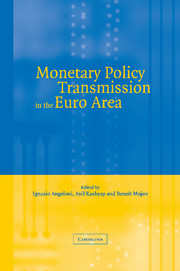 Monetary Policy Transmission in the Euro Area
Monetary Policy Transmission in the Euro Area Published online by Cambridge University Press: 22 September 2009
Introduction
This chapter presents empirical results of the monetary policy transmission process for Luxembourg based on firm-level data. It is the first empirical analysis of this kind for Luxembourg. We investigate whether Luxembourg firms' investment is sensitive to the user cost of capital, to what extent the user cost is affected by changes in the monetary policy indicator and whether the broad credit channel is relevant in Luxembourg.
Following the approach presented in Chatelain et al. (chapter 7 in this volume), we estimate a sales accelerator model of investment. These estimates permit us to analyse the effects of monetary policy on firms' investment decisions through the user cost of capital. In addition, we investigate whether firms' investment behaviour is significantly affected by the strength of their balance sheets, as indicated by the cash level–capital ratio. In order to analyse the presence of differential effects between firms, we examine the role of other firm-specific characteristics, such as age.
A brief account of some Luxembourg peculiarities
Luxembourg is one of the original member states of the European Community (EC) and, with an estimated population of approximately 440,000 people and a share of around 0.3 per cent in euro area GDP, the smallest economy in today's European Union. The average annual growth of real GDP was around 5.4 per cent between 1990 and 2000. The rapid expansion of the Luxembourg economy owes much to the developments in the financial sector, which started in the early 1980s.
To save this book to your Kindle, first ensure no-reply@cambridge.org is added to your Approved Personal Document E-mail List under your Personal Document Settings on the Manage Your Content and Devices page of your Amazon account. Then enter the ‘name’ part of your Kindle email address below. Find out more about saving to your Kindle.
Note you can select to save to either the @free.kindle.com or @kindle.com variations. ‘@free.kindle.com’ emails are free but can only be saved to your device when it is connected to wi-fi. ‘@kindle.com’ emails can be delivered even when you are not connected to wi-fi, but note that service fees apply.
Find out more about the Kindle Personal Document Service.
To save content items to your account, please confirm that you agree to abide by our usage policies. If this is the first time you use this feature, you will be asked to authorise Cambridge Core to connect with your account. Find out more about saving content to Dropbox.
To save content items to your account, please confirm that you agree to abide by our usage policies. If this is the first time you use this feature, you will be asked to authorise Cambridge Core to connect with your account. Find out more about saving content to Google Drive.